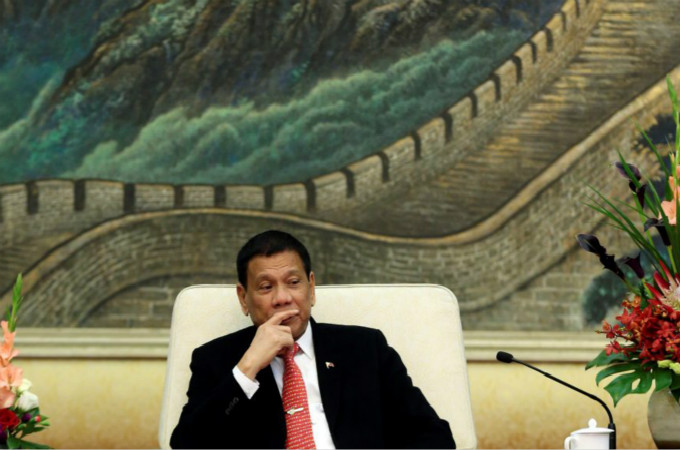
Photo from: Reuters
Philippines Foreign Minister Alan Peter Cayetano recently visited China to discuss cooperation in the South China Sea. He embarked on this mission amidst a growing domestic and international hue and cry protesting Philippines President Rodrigo Duterte’s decision to downplay the Philippines international arbitration victory over China regarding their conflicting sovereignty and maritime claims. Although many of his domestic and foreign policy decisions—as well as his style—are problematic, in this particular case his decision has merit.
It appears that it was not a one-off but rather part of his foreign policy pivot towards China and away from the U.S. Although his decision offends the sensibilities of many Western-educated or oriented lawyers at home and abroad, in the real world international law does not always trump geopolitics. The ivory tower defenders of the purity of international law and Filipino national pride do not have to shoulder the responsibility and the direct consequences of defending that purity and pride. Duterte foresaw dire consequences of doing so and has demonstrated remarkable determination and self -confidence in pursuing what he sees pragmatically as the best policy for the Philippines and Filipinos. In doing so, he has coincidently—and without support from Philippines allies and ‘friends’—calmed the tense situation in the South China Sea.
Of course there has been a price to pay for this ‘peace’—in this case the swallowing of some national pride. But Duterte recognized the reality that China is a powerful country that will be permanently prominent in the region and that the Philippines is militarily weak and politically isolated. So he decided that “discretion is the better part of valor.”
When no other claimant –including vociferous Vietnam and mellower Malaysia and Brunei—would step forward or even publicly support it, the Philippines under the previous administration of President Benigno Aquino III filed a foolhardy complaint against China with the International Tribunal on the Law of the Sea. This Philippine action was considered brash and even rash by some in ASEAN who criticized the Philippines for proceeding on its own without consulting them. So the Philippines became a guinea pig for the other claimants and a stalking horse for the U.S. which strongly encouraged the filing. But when the arbitration concluded in an almost total victory for the Philippines, some of these very same critics were disappointed that the then the newly elected Duterte did not rub the legal victory in China’s face and try to implement it.
Duterte immediately recognized that doing so would only anger China and cause it to dig in its heels on its claims such that there would be nothing to gain and a lot to lose-- economically and even kinetically for the bulk of the Filipino people—already locked in grinding poverty. He realized that none of these foreign cheer leaders --including the main instigator and whisperer the United States --would come to the Philippines’ aid in the event of a physical clash with China. Without such a guarantee –and perhaps even with it –the likely outcome would be a large loss of Filipino troops, islands and maritime space or a long cold or hot conflict that would severely hurt the Philippines economically and otherwise. For Duterte, patience and persistence triumphed over his natural predilection for belligerence and he had the courage to endure severe criticism from his own elite to do what he considered the right thing for the Filipino people. Someday the Filipino people may in retrospect recognize this and honor him for this stand.
Yes, according to the arbitration decision, China’s historic claim to the area and/or its resources is not consonant with the UN Law of the Sea Convention and is thus legally invalid. Moreover China is claiming and occupying at least two features in the legal Philippines Exclusive Economic Zone and on its continental shelf that are low tide elevations and thus belong to the Philippines. This means that the Philippines’ claims to resources within its claimed zones—like the fisheries outside the territorial sea around Scarborough Shoal and any oil or gas under the Reed Bank are its alone. But China disagrees. It refused to participate in the proceedings or to accept the result. So that means that China’s vague claims to and in the area still stand and it has made clear that it will go to the mat over them—against the Philippines and anyone else that dares to get involved militarily.
So for the time being Duterte has decided to put aside the legal victory and negotiate shared access to the resources. The result has been continued access to the fisheries for Filipino fishermen and the possibility of ‘joint development’ of any oil and gas. More important, China/Philippine relations have entered a new era of economic cooperation which may bring major benefits to the Filipino people.
Is it right or fair for the Philippines to have to swallow its pride while China seems to have snatched political victory from the jaws of legal –and political --defeat? Of course not –particularly from the Philippine perspective. But Duterte did the best he could under the circumstances. He really had little choice. Should he have allowed the U.S. to use the Philippines as its stalking horse—without a guarantee of backing it up if push came to shove? Moreover from a personal viewpoint he may have foreseen and feared that the U.S. would use the China threat to essentially re-occupy the Philippines militarily—and continue the social, cultural and psychological abuses that he and his people endured for so long. He believes that China’s ‘militarization’ of its occupied features in the South China Sea is aimed at the U.S. not the Philippines.
So the international law idealists wring their hands and howl into the wind but the caravan of reality moves on –in this case also incidentally reducing tension to the benefit of all in the region. But the purists should find some solace in the knowledge that the arbitration decision still exists and may be implemented at a later date. The Philippines has not abandoned its claim—only set it aside temporarily in the interest of peace.
Of course the Duterte administration should be careful not to prejudice its claims or rights. It can and should continue to protest privately or publically when it believes China –or any other country—has violated any understanding between them or the details of the arbitration result itself. It can and should avoid making any official statement that undermines its claims including acknowledging or even implying that any area that clearly belongs to it is “disputed”. This could legally weaken its claim and the arbitration ruling. Also by entering into a joint development arrangement for areas within its confirmed EEZ, it could be interpreted as tacit acknowledgement that the area is disputed and that the rival claimants’ claim has some merit. Clever lawyers should be able to mitigate this interpretation perhaps by incorporating in any agreement on joint development a clause that states clearly that the agreement does not prejudice its claims.
However, the current peaceful stalemate –with continued access to at least some of the resources—is better for the Philippines than the alternative. That would be no access to its own resources and crippling economic punishment by China. The critics may say this would be neither “legal” nor just. That may be so but it would be an alternative political reality that Duterte has wisely avoided by --in Voltaire’s immortal words-- “not making perfect the enemy of the good”.

Mark J. Valencia is an Adjunct Senior Scholar at the National Institute for South China Sea Studies, Haikou, China
This piece first appeared in IPP Review.
